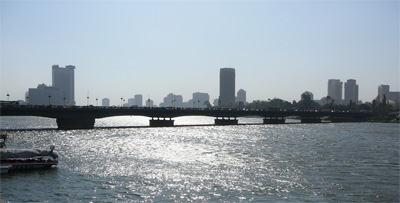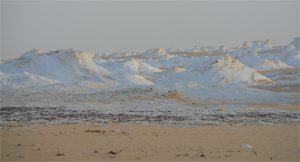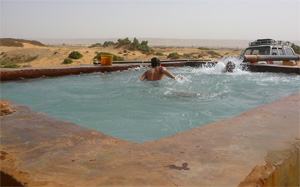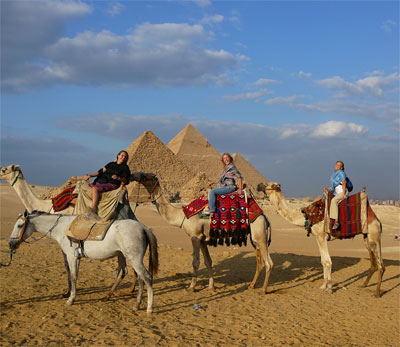TABLE
OF CONTENTS
|
Somewhere in the Middle
By Danica Taylor
When I
first saw Egypt
on the Fall 2006 Voyage
Itinerary, I knew I had to apply and be on this voyage. Initially, I
had no
preconceived expectations for Cairo, Alexandria, or Egypt in general. I knew
that I
wanted to see the pyramids and ride a camel and besides that I was open
just to
experience the culture and atmosphere of a place with an immense
history.

Upon arriving
in Cairo
I was astonished at the development and
infrastructure present, felt as if we were back into a global city with
numerous transnational elements. It was almost a relief to see such
development
and modernization. After being in countries like India, Myanmar
and Vietnam
it was
like a breath of fresh air to be in a country that appeared to be in
the
mainstream with technology, skyscrapers, transnational hotels lining
the water,
and traditional housing. The chapter written by Farha Ghannam, "Relocation
and the Creation of a Global City," describes Cairo,
as many do, as Umm
al-dunya, or Mother of the World. “the diversity of its neighborhoods,
old
quarters, and new western-style areas, high-rise buildings around the
Nile,
satellite dishes, foreign fast-food chains and the World Trade
Center…it has
something to offer everyone” (Ghannam, 25). This description paints
such a
beautiful picture of Cairo,
which is what I experienced. There really was something for everyone
here, the
history is so immense that a historian could spend their entire life
here, the
hungry foreigner could satisfy a western craving at the T.G.I. Fridays
on the
Nile, the nightlife is amazing because the town seems as if it never
sleeps, we
watched the BBC news and Inside Edition from the hotel room. We even
visited Cairo University
and were able to talk to some university students about life in Egypt
and what their plans for the future were; these examples could go on
forever
and ever.
We went to a shop that our driver
Ghimal’s friend owned and as they were resizing the rings and necklaces
we
bought they welcomed us into their home which was on the backside of
their
shop. It was beautiful, 4 stories, grass yard, and view of the
pyramids. We
were shocked at what a beautiful home and vehicles they had. There were
3
brothers who each had a level of the home and then the ground level was
a
common area. Two of the brothers had married two sisters and while we
were
there the father of the two sisters was visiting. Seeing the closeness
and the
compassion that families have for one another was so warming. I think
that this
is something that the United States could really
benefit from,
emphasizing the importance of family and dedication to loving and
supporting
family. This was a middle class family and home. You knew that they had
worked
hard for their money and that it was paying off.
All of these different emotions
and
experiences truly left a special place in my heart for Egypt.
In
addition to staying in Cairo I was also
fortunate enough to visit a desert oasis, 5 ½ hours away from Cairo.  This was
quite the opposite experience
from that of the transnational Cairo.
The desert took me right back into the developing country
characteristics that
have become so familiar to us. For example, there was no running water
at the
home we were staying at, we asked our guide Wahed, he assured us in the
morning
there would be water. Come 7am…still no water. We inquired again, and
he
responded “we’ll be at the cold spring in 3 hours, you’ll have a nice
shower
then.” This was
quite the opposite experience
from that of the transnational Cairo.
The desert took me right back into the developing country
characteristics that
have become so familiar to us. For example, there was no running water
at the
home we were staying at, we asked our guide Wahed, he assured us in the
morning
there would be water. Come 7am…still no water. We inquired again, and
he
responded “we’ll be at the cold spring in 3 hours, you’ll have a nice
shower
then.”  A that point we realized that
there would never be any water, but the thought of loosing out on a
profit was
enough that he would say anything to get us to stay. The
toilets without running water were a bit
of a different situation, but nonetheless it was a real quick reminder
of life
in a place that has yet to adhere to global and transnational standards
of
living. A that point we realized that
there would never be any water, but the thought of loosing out on a
profit was
enough that he would say anything to get us to stay. The
toilets without running water were a bit
of a different situation, but nonetheless it was a real quick reminder
of life
in a place that has yet to adhere to global and transnational standards
of
living.
All in all, Egypt
was a
great transitioning country. There were the extremely developed and
globalized
areas such as Cairo and Alexandria,
where if you visited these places only while in Egypt
you’d never know what life away from the Nile
was like. But contrary to this, life away from the Nile
is quite the polar extreme. I thought of whether or not the desert
areas of Egypt
would ever become developed, and then I
thought of Tucson and Phoenix…they’re
in the desert and still are
able to access running water and stable infrastructure. So in the end I
view Egypt
as
somewhere in the middle…between the hustle and bustle of a developed
nation and
the simplicity and difficulties of a developing one.
|



 This was
quite the opposite experience
from that of the transnational
This was
quite the opposite experience
from that of the transnational  A that point we realized that
there would never be any water, but the thought of loosing out on a
profit was
enough that he would say anything to get us to stay. The
toilets without running water were a bit
of a different situation, but nonetheless it was a real quick reminder
of life
in a place that has yet to adhere to global and transnational standards
of
living.
A that point we realized that
there would never be any water, but the thought of loosing out on a
profit was
enough that he would say anything to get us to stay. The
toilets without running water were a bit
of a different situation, but nonetheless it was a real quick reminder
of life
in a place that has yet to adhere to global and transnational standards
of
living.